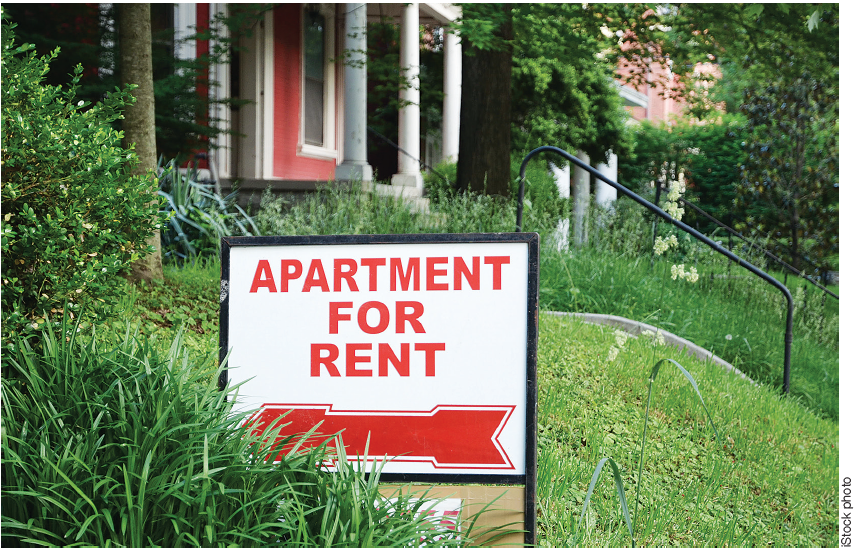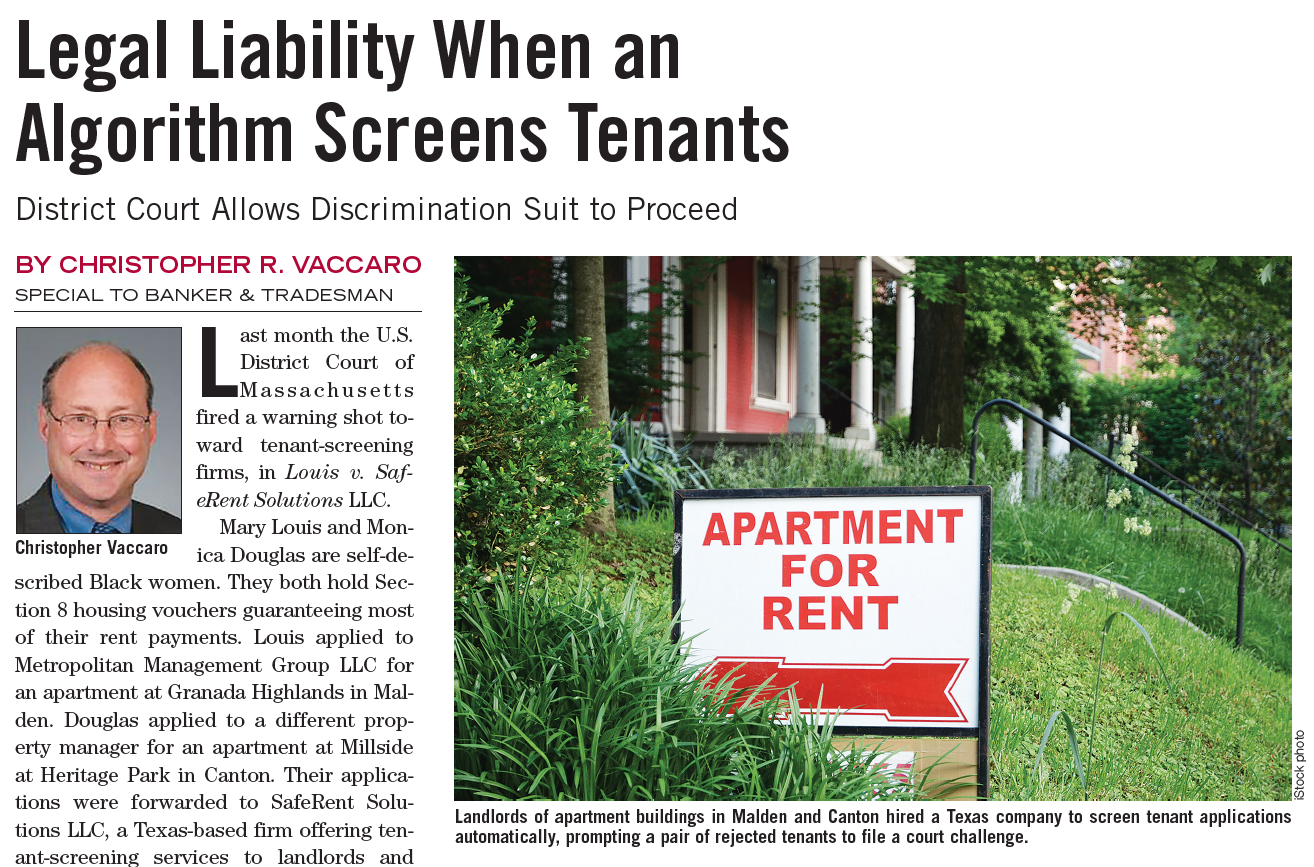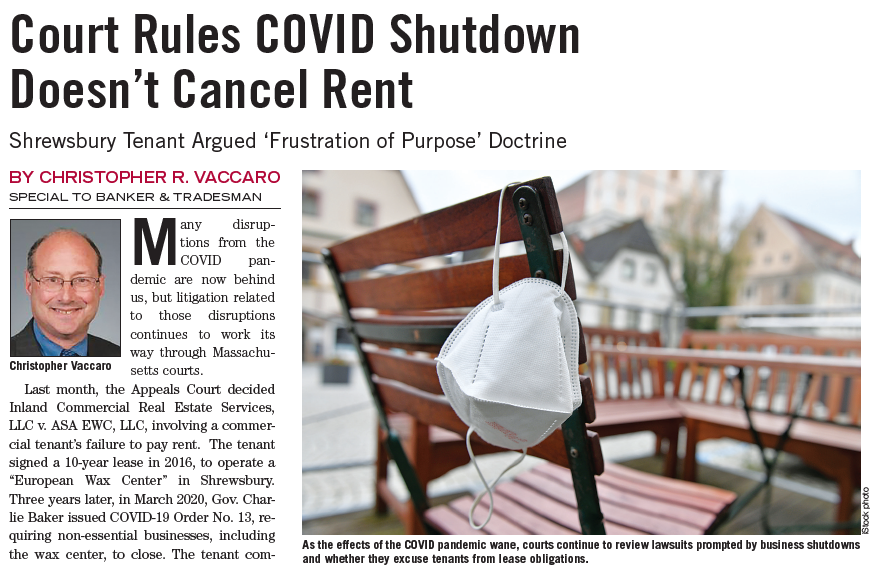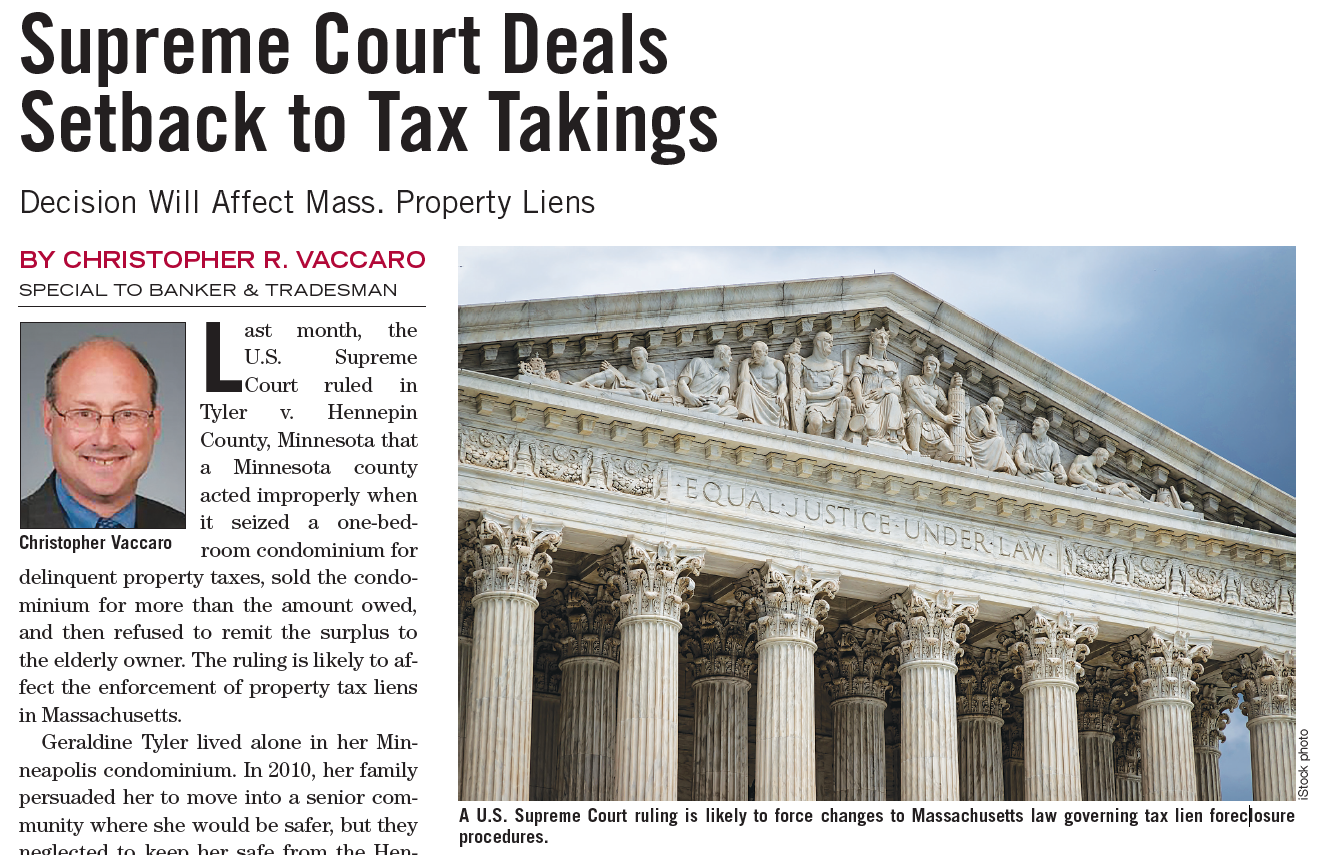 District Court Allows Discrimination Suit to Proceed
District Court Allows Discrimination Suit to Proceed
By Christopher R. Vaccaro
Special to Banker & Tradesman

Last month the U.S. District Court of Massachusetts fired a warning shot toward tenant-screening firms, in Louis v. SafeRent Solutions LLC.
Mary Louis and Monica Douglas are self-described Black women. They both hold Section 8 housing vouchers guaranteeing most of their rent payments. Louis applied to Metropolitan Management Group LLC for an apartment at Granada Highlands in Malden. Douglas applied to a different property manager for an apartment at Millside at Heritage Park in Canton. Their applications were forwarded to SafeRent Solutions LLC, a Texas-based firm offering tenant-screening services to landlords and real estate professionals nationwide.
SafeRent applies a proprietary algorithm to rental applications, using credit histories, bankruptcy records, past due accounts, payment performance and eviction histories. The algorithm generates a “SafeRent Score” that is intended to assess the likelihood of an applicant’s lease default. The SafeRent Score disregards the benefits of tenant housing vouchers.
Metropolitan rejected Louis’s application based on her SafeRent Score. Louis challenged the rejection, offering employment and landlord references, but without success. Douglas’s application was initially rejected because her SafeRent Score reflected credit history and landlord-tenant problems, but it was later accepted after she appealed with assistance from a housing advocacy group.
Louis and Douglas filed a putative class action lawsuit in federal court against SafeRent and Metropolitan for violations of federal and state antidiscrimination laws. They alleged that SafeRent’s algorithm generated lower scores for Blacks, Hispanics and voucher-holders, who often have less income and poorer credit histories, resulting in denials of rental housing applications based on race and use of vouchers. They also sued SafeRent for unfair and deceptive practices in violation of Massachusetts General Laws Chapter 93A. Community Action Agency of Somerville Inc. (CAA), which provides housing services to underprivileged individuals, joined the suit as a plaintiff.
SafeRent and Metropolitan moved to dismiss the lawsuit, arguing that Louis and CAA lacked standing, and that the plaintiffs failed to state actionable claims against them. Defendants often file motions to dismiss early in litigation, but the tactic rarely succeeds, because judges hearing those motions must assume, for purposes of the motion, that the plaintiffs’ factual allegations – but not legal conclusions – are true.
Court Finds Disparate Impacts
Federal and state laws prohibit discrimination in the sale and rental of housing because of race, color, religion, sex, familial status, and national origin. Massachusetts law also prohibits discrimination against voucher holders. The court easily found that Louis had standing to file suit, because she alleged that the defendants’ actions caused her application to be wrongfully denied, requiring her to accept costlier but less desirable housing in a neighborhood with a higher crime rate. The case for CAA’s standing was trickier because CAA itself was not denied housing by the defendants. Nonetheless, the court ruled that CAA had standing because SafeRent’s practices, if found to illegally discriminate, impaired CAA’s efforts to fulfill its mission of locating housing for its clients.
SafeRent also argued that antidiscrimination laws do not apply to it in this case, because SafeRent is not a landlord and it does not ultimately decide whether to accept or deny rental housing applications. The court disagreed, noting that SafeRent’s screening service influences housing decisions and, according to the plaintiffs’ complaint, causes prohibited discrimination.
The court next discussed disparate impact claims under anti-discrimination laws. Such claims are actionable under federal and Massachusetts law, when directed at practices that have disproportionately adverse effects on protected classes, without legitimate rationales. The court summarized the plaintiffs’ allegations that SafeRent’s reliance on credit history is misplaced, has a disparate negative impact on Blacks, Hispanics and voucher-holders, and limits their housing opportunities. The court ruled that these allegations were sufficient for the plaintiffs to proceed with their housing discrimination claims against the defendants. However, the court dismissed the plaintiffs’ Chapter 93A claims, ruling that their allegations did not suggest that SafeRent’s conduct was egregious enough to support a claim under that statute.
The court denied the defendants’ motions to dismiss the housing discrimination claims, but there is no certainty that judgment will someday be entered against SafeRent and Metropolitan. There remains much work to do. The plaintiffs must prove that SafeRent’s algorithm employs data with little relevance to whether applicants are worthy tenants, causing impermissible discriminatory impacts. SafeRent and Metropolitan will strive to prove that SafeRent’s algorithm reliably and fairly predicts whether applicants are likely to default, without significant adverse impacts on protected minorities.
While the parties gather data for their experts, SafeRent might want to revisit its methodology.
Download the article as seen in Banker & Tradesman on June 26, 2023. Learn more about Christopher R. Vaccaro.












